Happy Together
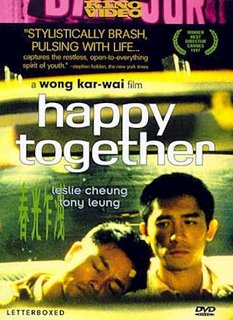 Happy Together
Happy Together(Hong Kong)
1997
Director:
Wong Kar-Wai
Producer:
Wong Kar-Wai
Writer:
Wong Kar-Wai
English and Chinese Subtitles
Cast:
Leslie Cheung Kwok-Wing, Tony Leung Chiu-Wai, Chang Chen
Review
by Kozo:
The latest from HK auteur Wong Kar-Wai is an elliptical, quicksilver experiment and the film that cemented his international reputation as one of the leading filmmakers of our time. Happy Together is an exercise in emotional estrangement—from one’s lover, one’s homeland, and oneself. Tony Leung Chiu-Wai and Leslie Cheung are the lovers whose tumultuous relationship is a process of breaking up and making up.
The two decide to start over in Buenos Aires, but true to form their bickering dissolves their relationship. Never reaching the waterfall they intended to visit in the first place, they go their separate ways. Somehow they find themselves back together, and the slow burn of their disintegrating love provides more exploration into the lives of lost, lonely souls that is Wong Kar-Wai’s never-ending obsession.
As is usual, there are no real answers provided by Wong's existential musings. Happy Together is simply a journey, and an affecting one. Eventually, what we find is reflection of where we belong, where we find our home, and what happened along the way. Christopher Doyle shoots the film in lovely shades of rich, lurid color. Arty and existential to an almost maddening end, this film is pure Wong Kar-Wai, which is equal parts longing, regret, and pathetic beauty. (Kozo 1997)
Awards:
17th Annual Hong Kong Film Awards
• Winner - Best Actor (Tony Leung Chiu-Wai)
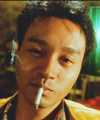
• Nomination - Best Picture
• Nomination - Best Director (Wong Kar-Wai)
• Nomination - Best Actor (Leslie Cheung Kwok-Wing)
• Nomination - Best Supporting Actor (Chang Chen)
• Nomination - Best Cinematography (Christopher Doyle)
• Nomination - Best Editing (William Cheung Suk-Ping, Wong Ming-Lam)
• Nomination - Best Art Direction (William Cheung Suk-Ping)
• Nomination - Best Costume Design (William Cheung Suk-Ping)
Golden Horse Awards
• Winner - Best Cinematography (Christopher Doyle)
Cannes Film Festival
• Winner - Best Director (Wong Kar-Wai)
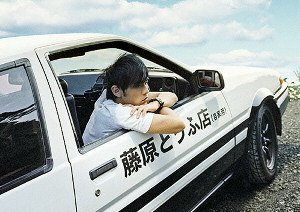
"As the film starts, things are good for Ho Po-wing (Leslie Cheung) and Lai Yiu-fai (Tony Leung). They've started a new life together in Argentina, where they would presumably not be as ostracized for their homosexuality as they were in Hong Kong. Every day is exciting and new, the country is beautiful, and they love being with each other. But fairly soon, when their car breaks down on the way to see what they've been told is a beautiful waterfall, everything they don't like about each other comes into sharp relief. Ho is reckless and irresponsible, Lai is cranky and bitter, and damn it, they've had enough. They break up, and Lai takes a menial job as a tango-club doorman to try and save enough money to go back home. He'd be happy if he never saw Ho again. Not going to be the case, though, as Ho is beaten and the only contact number he has is Lai's, and what's Lai going to do, throw this broken-limbed guy who speaks very little Spanish out into the street? No, that wouldn't be right.

Even though Lai is effectively caught in three traps - he can't afford the airfare to go home; he's got a demanding former lover sharing his apartment, eating his food, and rather unwelcomely trying to climb back into his bed; and the circumstances under which he left Hong Kong make asking his family for help not an option - the audience is only able to sympathize with him reluctantly. He's short-tempered, snotty, and unpleasantly resentful of the burden Ho represents. And yet, his nature is basically decent, even if his life is filled with enough aggravation to smother it. It takes meeting a young man from Taiwan (Chang Chen), also working his way across Argentina, for his more gregarious side to come out.
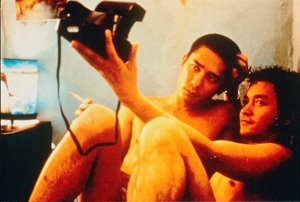 There doesn't seem to be much of a nice side to Ho. He's not the bully that Lai can be, at least not overtly. Leslie Cheung plays him as being a natural hustler; a guy who has always been able to charm his way into men's beds so that they would look out for him. That doesn't work out for him so well here; Lai has seen his game before. He comes off as something of a brat, really, and when Lai gives him a taste of what it feels like to be trapped, he doesn't get much of the audience's sympathy - Lai's a jerk for what he does, but it's about time Ho heard the word no. Even after he's been attacked for little more than being gay, any good will from the audience is short lived, as he starts trying to manipulate Lai soon after.
There doesn't seem to be much of a nice side to Ho. He's not the bully that Lai can be, at least not overtly. Leslie Cheung plays him as being a natural hustler; a guy who has always been able to charm his way into men's beds so that they would look out for him. That doesn't work out for him so well here; Lai has seen his game before. He comes off as something of a brat, really, and when Lai gives him a taste of what it feels like to be trapped, he doesn't get much of the audience's sympathy - Lai's a jerk for what he does, but it's about time Ho heard the word no. Even after he's been attacked for little more than being gay, any good will from the audience is short lived, as he starts trying to manipulate Lai soon after.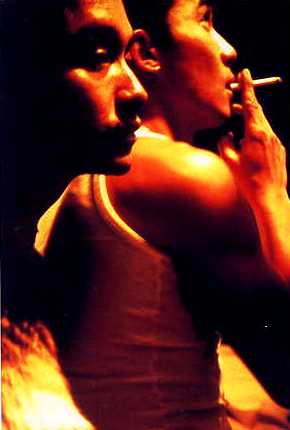
Writer/director Wong Kar-Wai's story is relatively simple and straightforward. The title, obviously, is ironic, as Lai spends most of the movie miserable; even after he meets Chang, he doesn't really cheer up or actually gain happiness; it just reassures him that there are states other than misery. Wong doesn't shy away from making Lai, his narrator and protagonist, unpleasant, but doesn't go so far as to make the audience enjoy his bad fortune. The audience might not actually enjoy his pettiness toward the end, but they'll certainly understand it.
Longtime Wong Kar-Wai collaborator Christopher Doyle again handles the cinematography, and, as usual, it's beautiful. The movie is primarily shot in black-and-white, with a few cut-aways in color to the waterfall that Ho and Lai never reach. The look highlights Lai's state of mind, as all the joy and color has been sucked from it. Indeed, within most shots, there isn't even very much contrast between light and dark: Everything in the frame comes out the same muddy grey, which makes the composition technically quite impressive, to prevent objects from seeming to run together. It's a bleak look, but manages that while still being clear......"
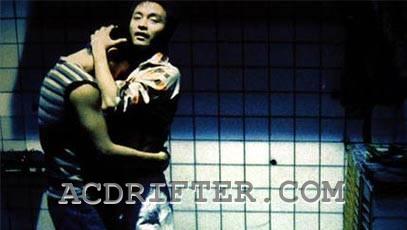 Tony Leung Chiu-Wai
Tony Leung Chiu-Wai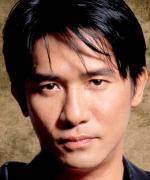 Biography: Tony Leung Chiu Wai (b. June 27, 1962. Hong Kong) is regarded as one of the biggest actors in Hong Kong and one of the few who may be recognized internationally. An intense and emotional actor, Leung has gone on to receive huge popular and critical success both in Hong Kong and abroad.
Biography: Tony Leung Chiu Wai (b. June 27, 1962. Hong Kong) is regarded as one of the biggest actors in Hong Kong and one of the few who may be recognized internationally. An intense and emotional actor, Leung has gone on to receive huge popular and critical success both in Hong Kong and abroad.Like many other famous Hong Kong actors, Leung made his name in television. Following the advice of his friend Stephen Chow, Leung trained at TVB. He took a number of comedy roles, his big success being Police Cadet in 1984, where he worked alongside Lau Ching-Wan, Carina Lau and Maggie Cheung. Leung also starred as the popular character Wai Siu-Bo in a TVB version of The Duke of Mt. Deer, which also featured Andy Lau. Still, Leung’s movie career had a slower start than some of his contemporaries and he often played supporting roles.
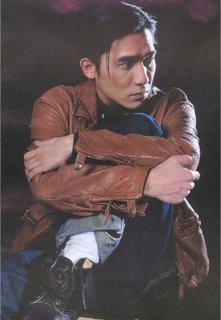 His work was eventually recognized; he received best supporting actor Hong Kong Film awards for People's Hero (1987) and My Heart is That Eternal Rose (1989).
His work was eventually recognized; he received best supporting actor Hong Kong Film awards for People's Hero (1987) and My Heart is That Eternal Rose (1989).It was around this time that Leung began a relationship with Carina Lau, and he began to pursue lead roles to further his film career. In 1992, Leung made a big impact in John Woo’s Hard Boiled opposite Chow Yun Fat. In many ways, this was a career-defining performance, and Leung was nominated for yet another supporting actor award at the HK Film Awards. Leung played the supporting role as if it were a lead, and the resulting performance was powerful enough to match Chow Yun Fat’s charismatic turn.
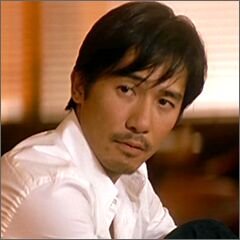
Through the rest of the nineties his career continued to ascend, and he began to be seen as a serious art film actor. Leung took roles in independent films from director Wong Kar Wai, notably Chungking Express (1994) and Happy Together (1997), both of which landed him best actor awards at the Hong Kong Film Awards. In addition, his work in Chungking Express earned him the best actor award from the Taiwan Golden Horse Awards. Leung also starred in a number of slick UFO productions: He Ain't Heavy, He's My Father (1993), Dr. Mack (1995) and Heaven Can't Wait (1995).
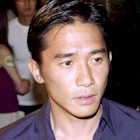 The pinnacle of Leung's success came with Wong Kar-Wai's In the Mood for Love (2000), a film which earned him another HKFA Best Actor award as well as international recognition with the Best Actor award at the Cannes Film Festival.
The pinnacle of Leung's success came with Wong Kar-Wai's In the Mood for Love (2000), a film which earned him another HKFA Best Actor award as well as international recognition with the Best Actor award at the Cannes Film Festival.To account for Leung’s success we only have to look at his acting style: he is quiet and intense, with a powerful screen presence that draws the audience in, so that every nuance, every movement has emotional power. It seems Leung’s career has only gotten better. Recently, he has had huge commercial and critical success with his roles in Infernal Affairs (2002) and Hero (2002), two of the biggest Hong Kong movies ever. He received another Best Actor Award at the Hong Kong Film Awards for Infernal Affairs, a record fourth win in that category and his sixth statuette overall. (James Percy 2003)
Leslie Cheung Kwok-Wing
| Born |
| September 12, 1956 Kowloon, Hong Kong |
| Died |
| April 1, 2003 Central, Hong Kong |
Leslie has been the hardest working Diva in Hong Kong for the past twenty-years.
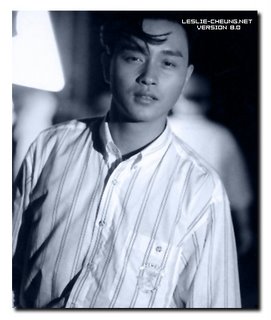 During this time he has become both one of Hong Kong's finest actors as well as one of it's most popular male singers. Even his oft-hinted at homosexuality and flamboyant concerts that make Madonna's look tame have not negatively impacted his popularity as a leading romantic man in Hong Kong films. He is simply a Hong Kong institution and he knows it.
During this time he has become both one of Hong Kong's finest actors as well as one of it's most popular male singers. Even his oft-hinted at homosexuality and flamboyant concerts that make Madonna's look tame have not negatively impacted his popularity as a leading romantic man in Hong Kong films. He is simply a Hong Kong institution and he knows it.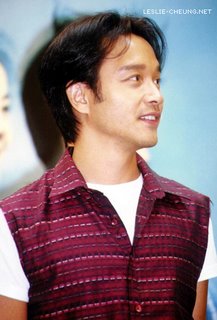 Leslie came in second place at an Asian Singing Contest in the late 70's and he released his first album in 1978. Soon after, he made his film debut in 1980 (Leslie himself described his first venture into film, Erotic Dream of the Red Chamber, as "a disaster, a low-budget movie, very indecent" in an interview with the author of Hong Kong Babylon (1997), Fredric Dannen). Over the next two decades he has worked simultaneously at both careers, appearing in many great films and consistently producing well-received albums.
Leslie came in second place at an Asian Singing Contest in the late 70's and he released his first album in 1978. Soon after, he made his film debut in 1980 (Leslie himself described his first venture into film, Erotic Dream of the Red Chamber, as "a disaster, a low-budget movie, very indecent" in an interview with the author of Hong Kong Babylon (1997), Fredric Dannen). Over the next two decades he has worked simultaneously at both careers, appearing in many great films and consistently producing well-received albums.His big film break came in 1986 when John Woo and Tsui Hark cast him as the idealistic cop in A Better Tomorrow. Though Chow Yun Fat and Ti Lung were the stars of the film, Leslie's idol looks made him a popular star as well. From this point on Leslie was to become one of the premier actors in Hong Kong. His reputation as a romantic leading man was cemented the following year in 1987 when he appeared as a shy scholar in A Chinese Ghost Story opposite Joey Wong. The two of them were a smash hit in the sequel as well.
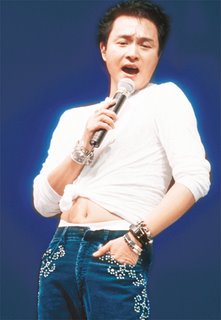
Though Leslie could easily have continued doing romantic idol roles, he has never been one to shy away from a challenging part and he has taken on difficult roles in a series of films such as Days of Being Wild, Ashes of Time, Farewell My Concubine and Double Tap. When he wasn't involved in serious dramas, Leslie showed that he was still the perfect romantic lead in such classics as He's a Woman, She's a Man and The Chinese Feast (both of which he strikes up lovely sparks with Anita Yuen) and The Bride with White Hair (in a rapturous pairing with Brigitte Lin).
Chang Chen
 Debut en el cine a los 14 anos bajo la direccion de Edward Yang en "A BRlGHTER SUMMER DAY", Y desde ese momento ha intervenido en "MAHJONG" de Edward Yang, "HAPPY TOGETHER" de Wong Kar-Wai, "BETELNUT BEAUTY" de Lin Cheng Sheng y "TIGRE Y DRAGON" de Ang Lee.
Debut en el cine a los 14 anos bajo la direccion de Edward Yang en "A BRlGHTER SUMMER DAY", Y desde ese momento ha intervenido en "MAHJONG" de Edward Yang, "HAPPY TOGETHER" de Wong Kar-Wai, "BETELNUT BEAUTY" de Lin Cheng Sheng y "TIGRE Y DRAGON" de Ang Lee.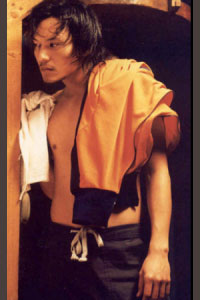
Ha sido compaero de reparto de Faye Wong en "CHINESE ODYSSEY 2002" de Jeff Lau, y le volveremos a ver al lado de Gong Li en "2046" y en el episodio del film "EROS", dirigido por Wong Kar-Wai.
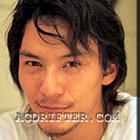

0 Comments:
Post a Comment
<< Home